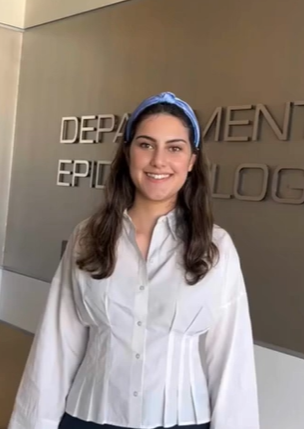From pesticides to psychosocial stress, the environments we experience before birth may influence our health for years to come, and Atlanta ARCS Scholar Sarina Abrishamcar is working to uncover exactly how.
At Emory University’s Rollins School of Public Health, Abrishamcar is investigating how prenatal environmental and psychosocial exposures affect child neurodevelopmental outcomes, such as anxiety, ADHD, and depression. Her work focuses on identifying both environmental risk factors—like pesticide exposure and food insecurity—and biological mechanisms, including epigenetic aging, that might explain how these early-life conditions alter a child’s developmental trajectory.
“Epigenetics looks at how our genes are expressed without changing our DNA,” Abrishamcar explains. “By measuring biological age from the genome, we can see whether a child’s development is accelerated or delayed due to early exposures.”
Her study, based on a birth cohort in South Africa, also seeks to address a longstanding gap in genetic research: the underrepresentation of children of African and mixed ancestry.
“Most genetic studies are done in populations of European ancestry,” she notes. “That leaves out groups who often bear the greatest burden of environmental and social stressors. I hope my research helps shed light on how these cumulative exposures contribute to health disparities.”
Sarina’s path to this research was shaped by an unexpected pivot. With her background in pharmacology, she began graduate school during the COVID-19 pandemic—when many clinical research opportunities were on hold. A chance meeting with her now-advisor, opened a new door into the field of gene–environment interactions, and she quickly found herself captivated by what she calls “the ultimate nature-versus-nurture question.”
Supported by the ARCS Atlanta Chapter, Abrishamcar says the award has been instrumental to both her academic and personal success.
“PhD students don’t get paid enough to live comfortably in a city like Atlanta,” she shares. “The ARCS support has not only provided financial relief for basic living expenses, but it’s also allowed me to focus more fully on my research.”
That support has also taken her around the world. In the past year, she has presented her work at the Society for Epidemiologic Research Annual Meeting in Austin, the International Society for Environmental Epidemiology Conference in Santiago, Chile, and the American Society for Human Genetics Meeting in Denver, Colorado.
“The ability to travel, share my research, and connect with other scientists has been invaluable,” she says. “ARCS funding has truly advanced my professional development and allowed me to grow as both a researcher and a person.”
As she looks toward graduation in 2026, Abrishamcar hopes her work will continue to inform a more equitable and inclusive understanding of child health.
“Ultimately,” she says, “I want my research to help us see how both biology and environment shape who we become and how we can use that knowledge to build healthier futures for every child.”

